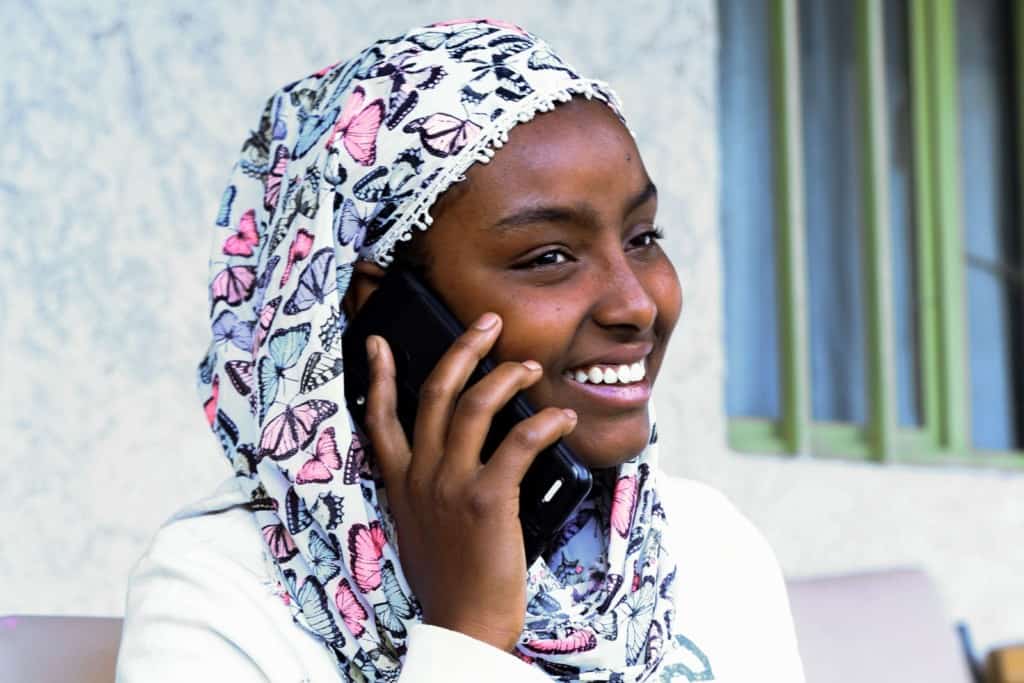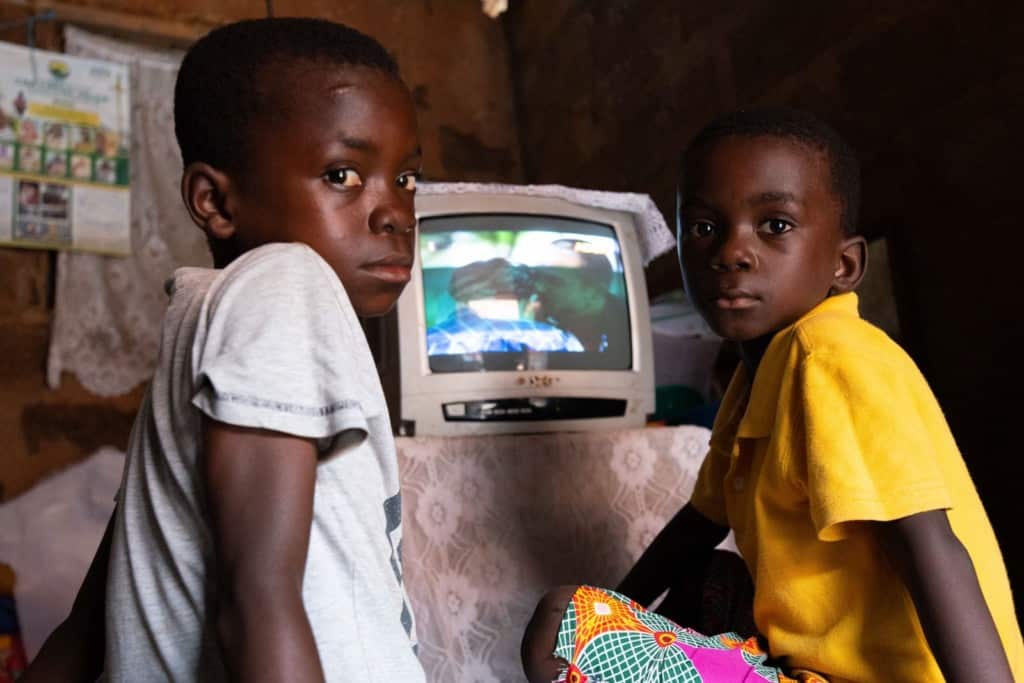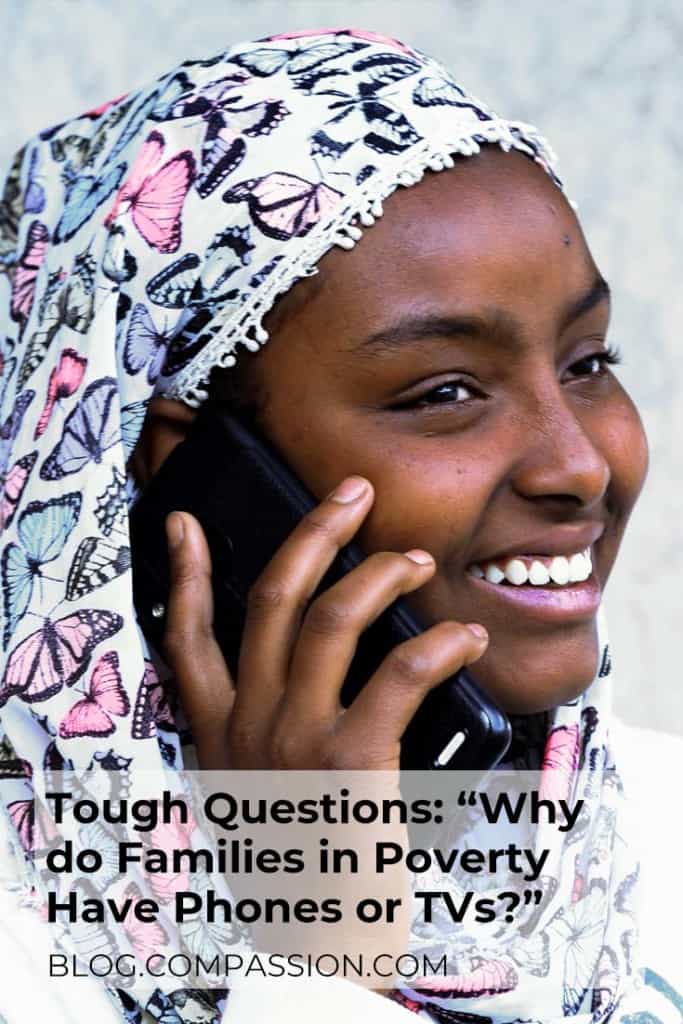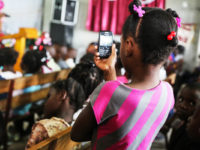This is part four in a five-part series answering tough questions people ask about poverty. (Read the previous post.) We put five difficult questions to parents of children in Compassion’s program. In vulnerably sharing their experiences, they hope to break the stigma and reveal the truth about living in poverty.

Tough Question 4: “Why do families in poverty have luxuries like a cellphone or television?”
According to the World Bank, the world’s poorest families are more likely to have access to a mobile phone than a toilet or electricity. As technology advancements reach the most remote corners of the globe, devices like cellphones and televisions are becoming important tools for daily life. They’re also becoming a lot more affordable.
Not Luxuries but Necessities
Unable to afford a cellphone, Consuelo and Orlando worried how their employers would contact them. A gift solved their problem. “My employer gave me a phone so she can call me, because it was hard for her to let me know when she needed me,” she says.
The couple’s secondhand television was carefully budgeted for and bought on a payment plan. “Well, I do not consider what we have as luxuries. The TV is not even new, it is a secondhand item. We bought it in two payment installments: one was [US] $15, the other was $10. We spent two weeks afterwards on a very tight budget and I made the payments when I was able to, with time between payments,” says Orlando.
Gifts From Family or Friends
“My eldest son loves to watch TV, so he always [went] to the neighbor’s house to watch TV. One of my relatives saw this and they gave us an old TV that they do not use. Now we have a source to get all the news of what is happening,” says Devaki in Sri Lanka.
For News, Learning and Entertainment
“Even though we are poor, we also need entertainment and information that we can get from TV. Since the pandemic, our children need to use a cellphone for online learning because they can’t attend school. I bought a television on credit, which I paid off for several months, like the cellphone,” says Frangky in Indonesia.

In Sri Lanka, Devaki was initially oblivious to the global pandemic because she didn’t have access to the news. “We did not have a TV or phone for a long time and when COVID-19 started we didn’t know what was happening in the world around us and even in our own country. We had no source to get news,” she says.
As mentioned above, a family member gifted Devaki’s son with a TV. Since her family doesn’t have access to a smartphone or an internet connection, the television enables her children to keep learning while school classes are held remotely. “Because of the TV, they watch the educational programs that are broadcasted in the local channels and they can still learn,” says Devaki.
In our final article on tough questions about poverty, parents will answer the question: “What Don’t People Understand About Life in Poverty?”
Field photography and reporting by Vera Aurima, Odessa B, Nico Benalcazar, Caroline Mwinemwesigwa and Alejandra Zuniga.








4 Comments |Add a comment
It just breaks my heart that impoverished people even feel they have to justify what they own! It’s like we are telling them that because they are poor they are required to do without certain things. I pay for a cellphone for my daughter, a single mom in another state, so that I can have contact with her, and she has a number to put on her job applications. She also needs a working number for her children’s school to contact her. My grandchildren often have nicer clothes and shoes than you would expect of a poor family because all of the grandparents purchase what we can towards their needs. How dare anyone criticize a poor family for having a “luxury” item or two, without knowing all the facts!
As someone who does not own a television and only just recently got a smart phone, I’m a bit taken aback. I’m not sure you can call these things truly necessities in many cases. I’m also a sponsor, by the the way. Part of the reason behind choosing not to have these things is to be able to support my sponsored children. At this point I almost have to second guess my sponsorship. It always sounded like we were helping those who are less fortunate. I also do not have a home of my own. I’m a single mom who rents an apartment. I find a way to make do with what I have. I’m confused. Yes, I read the article about why these things are “necessary” but are they REALLY? As in, is there nothing more beneficial, and what are we teaching our kids by making these items so important? My own children write to our sponsored children and pray for them. How confusing will it be one day if our sponsored children write that they have a television or a smart phone? I’m a bit hurt and confused that these things are suddenly priorities instead of things like food and shelter.
Amy, I am very sorry if this article caused you to feel hurt and confused. As a sponsor myself, I can absolutely understand where you are coming from. First, I want to thank you for the personal sacrifices you have made in order to sponsor a child! That is not something we take lightly and we are honored that you have chosen to impact a child that way.
Second, please know that we are in no way trying to prioritize technology items over necessities such as food and water. We provide every single child in our program with essentials such as nutritious meals, clean drinking water, and medical checkups. Our goal is to provide holistic care for children. Please know that this article is meant to provide an explanation for why some people who live in poverty might have access to technology. Often times having a cell phone, even if it is low quality, provides a way for children to listen to schooling lessons or provides their caretaker’s opportunities for jobs they may not have gotten otherwise. Sadly, in some of these places we work, access to a cell phone is easier to get than access to clean drinking water. You are right that cellphones or TVs are not a necessity like food and water, however, they provide families a way of making income to get essentials like food and water. I hope this helps explain a bit. We have also sent you an email and we would be happy to continue our conversation through there if you have any additional questions. Thank you for your care for your sponsor child!
It is really true that People’s living in poverty have phones. In my country Ghana West Africa, Phone, just to do calling is not expensive. The cheapest phone cost $10. The reasons why families in poverty have access to phone is to call family and friends. In Ghana, families in highly poverty do not have television in their homes.They go to neighbors to watch tv. Some do not have access to electricity. The cheapest television in Ghana cost $40.